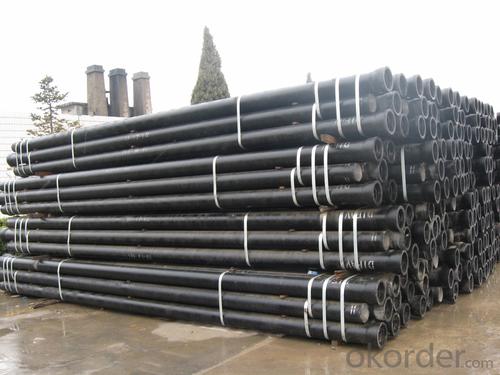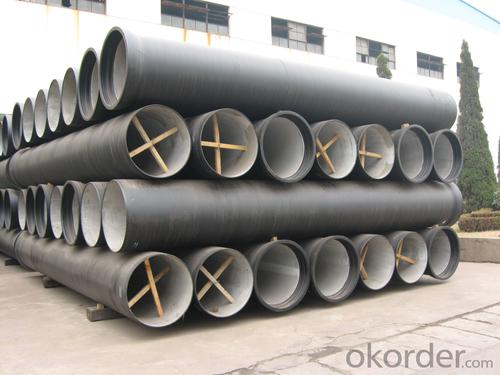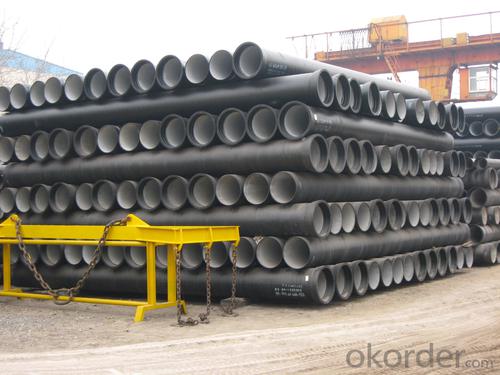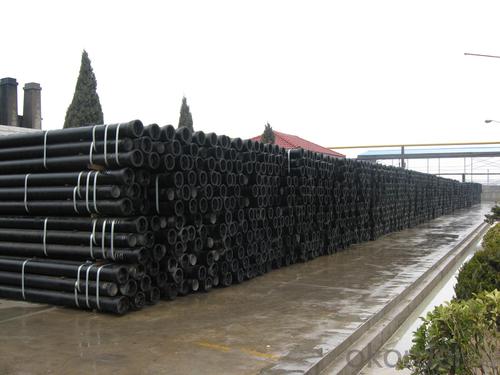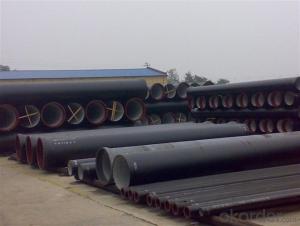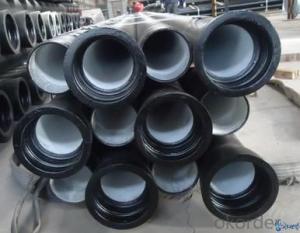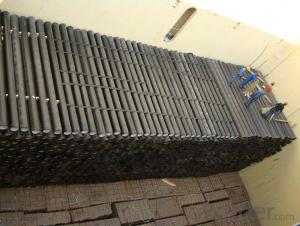DUCTILE IRON PIPE DN150 K8
- Loading Port:
- China Main Port
- Payment Terms:
- TT or LC
- Min Order Qty:
- 23 m.t.
- Supply Capability:
- -
OKorder Service Pledge
OKorder Financial Service
You Might Also Like
Specification:
1) The standard of pipe: ISO2531:1998, K9
2) Effective length: 6m
3) Inner cement line: Portland cement line as per ISO4179
4) Zinc coating: at least 130g/m2 as per ISO8179
5) Bitumen painting: at least 70um as per ISO8179
6) With 100% quantity of NBR ring, or SBR ring, or EPDM ring as per ISO4633
7) DN80mm-800mm
8) High strength, lighter than grey iron, good corrosion resistance, no furring, small flow resistance, easy fixing, long life tome about 100 yeas
9) Produced by Hangzhou chunfeng machine
10) Checked by automatic inspection equipment
11) Composition:
Chemical composition | ||||||
Chemical composition | Ductile Cast Iron Pipe (%) | Grey iron pipe (%) | Steel pipe (%) | |||
C | 3.5-4.0 | 3.2-3.8 | 0.1-0.2 | |||
Si | 1.9-2.6 | 1.4-2.2 | 0.15-0.4 | |||
Mn | 0.15-0.45 | 0.4-0.6 | 0.3-0.6 | |||
P | ≤0.06 | ≤0.3 | 0.02-0.03 | |||
S | ≤0.02 | ≤0.1 | 0.02-0.03 | |||
Mg | 0.03-0.06 | |||||
12) Feature:
Mechanical properties | ||||||
Ductile Cast Iron Pipe | Grey Iron Pipe | Steel Pipe | ||||
Tensile Strength(Mpa) | ≥420 | 150-260 | ≥400 | |||
Yield Strength(Mpa) | ≥300 | No Confirmation | No Confirmation | |||
Bending Strength(Mpa) | ≥590 | 200-360 | ≥400 | |||
Elongation (%) | ≥10 | Neglected | ≥18 | |||
Brinell Hardness(HBS) | ≤230 | ≤230 | About 140 | |||
13) T type mechanical joint
14) Packing: in bulk or container
Our raw materials are all from the largest steel factories in China and are of excellent quality ,Please don't hesitate to contact us, your inquiry will be highly appreciated and treated.
- Q: Can ductile iron pipes be used for underwater installations?
- Yes, ductile iron pipes can be used for underwater installations. Ductile iron is a strong and durable material that is resistant to corrosion, making it suitable for submerged applications. Additionally, ductile iron pipes have excellent joint integrity, ensuring water-tightness even under high hydrostatic pressure. The pipes are often coated with protective linings and coatings to further enhance their resistance to corrosion and extend their lifespan in underwater environments. Overall, ductile iron pipes are a reliable choice for underwater installations due to their strength, durability, and corrosion resistance properties.
- Q: Can ductile iron pipes be used for seawater intake systems?
- Yes, ductile iron pipes can be used for seawater intake systems. Ductile iron has excellent corrosion resistance properties, making it suitable for use in seawater environments. Additionally, ductile iron pipes are known for their strength and durability, which makes them ideal for handling the high pressures and harsh conditions associated with seawater intake systems.
- Q: How do ductile iron pipes handle ground settlement?
- Due to their inherent flexibility and resistance to deformation, ductile iron pipes are highly effective in managing ground settlement. The exceptional qualities of ductile iron, such as its high tensile strength and elongation capacity, make it an ideal material for enduring ground movement. When ground settlement occurs, characterized by the downward shifting of soil or sediment, ductile iron pipes possess the capability to flex and adapt to the changing ground without fracturing. The pipes can absorb the stress caused by settlement and evenly distribute it along their length, minimizing the likelihood of cracks or breaks. Moreover, ductile iron pipes are constructed with a bell and spigot joint system, which permits slight movement and rotation at the joints. This characteristic allows the pipes to accommodate ground settlement by absorbing any misalignment or shifting of the surrounding soil. Furthermore, ductile iron pipes exhibit a greater load-bearing capacity than alternative materials like PVC or HDPE. This implies that they can endure heavier loads and pressures from the surrounding soil, reducing the possibility of pipe failure or collapse during ground settlement. In conclusion, ductile iron pipes are excellently equipped to handle ground settlement due to their flexibility, resistance to deformation, and ability to evenly distribute stress. Their unique properties ensure their ability to withstand the challenges presented by shifting ground conditions, making them a dependable choice for underground infrastructure projects.
- Q: How do ductile iron pipes handle extreme temperatures?
- Ductile iron pipes, also known as cast iron pipes, are known for their ability to handle extreme temperatures effectively. The material composition of ductile iron allows it to withstand both high and low temperatures without experiencing any significant damage or degradation. At high temperatures, ductile iron pipes exhibit excellent thermal resistance, making them suitable for applications where hot liquids or gases need to be transported. The high melting point of ductile iron, which ranges between 2060°C and 2200°C, ensures that the pipes can handle extreme heat without melting or deforming. This makes them ideal for use in industries such as oil and gas, steam distribution, and high-temperature water supply systems. Similarly, ductile iron pipes also perform well in low-temperature environments. They have a low coefficient of thermal expansion, meaning they can withstand the contraction and expansion that occurs during temperature fluctuations without cracking or fracturing. This makes them suitable for use in cold climates or applications that involve the transportation of chilled liquids or gases. Moreover, ductile iron pipes have excellent thermal conductivity, which allows them to quickly dissipate heat. This property is particularly important in high-temperature applications where efficient heat transfer is crucial to prevent damage to the pipes or the substances being transported. In summary, ductile iron pipes can handle extreme temperatures effectively due to their high melting point, low coefficient of thermal expansion, and excellent thermal conductivity. These properties make them a reliable choice for various applications that involve extreme temperature conditions.
- Q: What is the expected deflection range for ductile iron pipes?
- The expected deflection range for ductile iron pipes can vary depending on several factors such as pipe diameter, wall thickness, soil conditions, and installation methods. Generally, ductile iron pipes have a higher deflection capacity compared to other materials like PVC or concrete pipes. For smaller diameter ductile iron pipes (up to 12 inches), the expected deflection range is typically around 2-3% of the pipe diameter. This means that a 12-inch ductile iron pipe could deflect up to approximately 0.24-0.36 inches. For larger diameter ductile iron pipes (greater than 12 inches), the expected deflection range can be slightly higher, ranging from 2-5% of the pipe diameter. This means that a 24-inch ductile iron pipe could deflect up to approximately 0.48-1.2 inches. It is important to note that these values are general estimates and should be verified with the manufacturer's specifications or engineering design guidelines for a specific project. Additionally, proper installation techniques and backfilling practices should be followed to ensure the pipe's structural integrity and prevent excessive deflection.
- Q: Can ductile iron pipes be made into clear tubes?
- Not recommended to do the tube, mainly aesthetic problems
- Q: What are the common causes of failure in ductile iron pipes?
- The common causes of failure in ductile iron pipes include corrosion, external loading, ground movement, manufacturing defects, and improper installation or maintenance.
- Q: If the ductile iron pipe is broken, can we use rush repair?
- These specifications are also based on the outer diameter of the tube. In daily life, we may also encounter a pipeline rupture, or when it is on the road to repair, excavator accidentally hit PE, PPR water supply and drainage pipeline, as long as a little, can be used to repair the pipeline repair section.
- Q: Are ductile iron pipes suitable for sewage treatment plants?
- Yes, ductile iron pipes are suitable for sewage treatment plants. Ductile iron pipes are known for their durability, strength, and corrosion resistance, making them ideal for handling the corrosive and abrasive nature of sewage. They can withstand high pressure and are capable of accommodating heavy loads and ground movements, making them a reliable choice for sewage treatment facilities. Additionally, their smooth interior surface minimizes friction, reducing the risk of clogs and improving the flow of wastewater.
- Q: Can ductile iron pipes be used for irrigation systems in agricultural fields?
- Ductile iron pipes are indeed suitable for use in agricultural fields for irrigation systems. Their durability, strength, and corrosion resistance are well-known, making them an excellent choice for a variety of applications, including irrigation systems. These pipes can withstand high pressures and effectively transport water for irrigation purposes. Moreover, the ductile iron material is resistant to various environmental factors like UV rays, soil chemicals, and temperature changes, ensuring that the pipes have a long lifespan. Additionally, ductile iron pipes exhibit excellent flow characteristics, enabling efficient water distribution across the agricultural fields. In summary, ductile iron pipes offer a reliable and sturdy option for irrigation systems in agricultural fields, delivering a sustainable and efficient solution for water distribution.
Send your message to us
DUCTILE IRON PIPE DN150 K8
- Loading Port:
- China Main Port
- Payment Terms:
- TT or LC
- Min Order Qty:
- 23 m.t.
- Supply Capability:
- -
OKorder Service Pledge
OKorder Financial Service
Similar products
Hot products
Hot Searches
Related keywords




